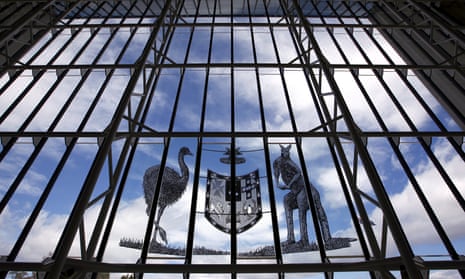The Australian government has been ordered to pay an Iraqi asylum seeker $350,000 in damages for unlawfully detaining him for more than two years, following a legal battle that could set a precedent for similar cases.
The federal court on Monday found the man, identified only by the pseudonym MZZHL, had been unlawfully detained by the commonwealth from March 2019 until May this year, because the Department of Home Affairs was not pursuing the purpose of his detention, which was “removing him from Australia”, during that time.
Alison Battisson, director principal of the group Human Rights for All which ran the case, said the judgment was “incredibly significant” because unlike other detention cases before the high court, this case focused on the purpose of detention.
“This decision says if you are not pursuing the purpose of detention, then the detention is no longer lawful, and it doesn’t matter if they have a visa or not,” Battisson told the Guardian.
The man was originally detained after arriving in Australia by boat in May 2012. After his application for a protection visa was rejected, he was granted a temporary bridging visa while he sought to challenge his immigration status.
His challenge was unsuccessful, and after his bridging visa expired in June 2014, he was detained again in August 2018.
In October 2018, the man requested to return to Iraq, however he withdrew that request in March 2019 claiming his life was in danger if he returned.
He said this was because his parents’ home had been burned down by a group linked to the government, and that they had only targeted his family after first trying to find him.
In his judgment, justice Geoffrey Flick found the Iraqi man had been “unlawfully deprived of his liberty and should have been released” from detention “soon after March 2019 or (at the very latest) by no later than mid-2019”.
Following MZZHL’s withdrawal of his request to return to Iraq, the purpose of his detention was still to remove him from Australia.
However the federal court heard the commonwealth conceded it did not take steps to inquire with Iraqi authorities whether they would be prepared to receive an “involuntary removal” – which it was required to do under the migration act.
Flick noted evidence from Department of Home Affairs officials that the department did not engage Iraq about involuntary removal of citizens, or on any issues at all, due to “significant political instability” related to the downfall of the Islamic State, sectarian issues, and the fact the “Iraqi government was perceived as regularly on the brink of collapse”.
However Flick said these difficulties engaging Iraq did not explain why the department did not take steps “to secure the removal of the applicant to some other country or even to secure his release from detention by the grant of some form of visa.”
In January 2020, detention officials received video of the man’s family’s house burning down.
However it was only on 4 May this year, the day the court hearing began, that MZZHL was released from detention and granted a departure bridging visa and a humanitarian stay visa.
Flick’s judgment was damning of the fact that a departmental submission about the case in January this year “did not place before the minister any material or any analysis as to whether the continued detention of the applicant was lawful or any analysis of the ‘purpose’ being pursued.”
“Had the minister for immigration (Alex Hawke) been properly advised in January 2021, it may safely be assumed that he would in all likelihood have intervened ... as he ultimately did in May.”
Flick was also damning of the previous immigration minister, David Coleman, noting had he “properly considered the plight of the applicant” in March 2019, when he withdrew his application to return to Iraq out of safety concerns, then Coleman “would in all likelihood not have countenanced the continued unlawful detention of the applicant and would in all likelihood have granted him a visa.”
As a result of the unlawful detention, the court ruled the commonwealth will have to pay MZZHL $350,000 to compensate him for “the deprivation of his liberty” and “the mental stress he has endured”.
Battisson said the judgment was significant because “it really says that active steps have to be taken to pursue removal”.
“It says you can’t have just asked the person the same question over and over again to justify the person’s detention ... What tends to happen is people who are detained over a number of years, every so often they’re asked if they want to return to their home country, and they say no, and then they wait a few months in detention before asking them.
“I suspect the government will be slightly worried about the precedent this sets about the quantum of damages,” Battisson said.
The commonwealth must pay the man’s legal costs and $350,000 in damages within 28 days.
The Guardian contacted the Department of Home Affairs for comment.
